Moscow debating ‘foreign agents’ bill
MOSCOW

Russia’s President Vladimir Putin (R) and Prime Minister Dmitry Medvedev (2nd L) clink glasses in the Kremlin Palace. AFP photo
Russia’s Parliament is set to debate a bill forcing internationally-funded NGOs to register as “foreign agents,” a move that may stigmatize scores of groups during President Vladimir
Putin’s new term.
The bill, which is scheduled to be debated this week, comes after Putin accused opposition activists demonstrating against his 12-year rule of being in the pay of the U.S. State Department. The ruling United Russia party, which sponsored the bill, says it is aimed at preventing foreign states from influencing Russia’s domestic politics and emulates U.S. legislation on foreign-funded NGOs.
‘Prepare your cash’“Obviously there are gaps in our legislation,” one of the bill’s authors, Alexander Sidyakin, a member of Parliament for United Russia, told Agence France-Presse. “Prepare your cash, foreign agents! :)” Sidyakin wrote on his Twitter account.
He said the first reading was scheduled for July 6, while the second and third readings would take place next week. Under the broad bill, all Russian NGOs that are funded from abroad and ruled to be involved in politics or acting in the interests of foreign states and other international donors will have to register as “foreign agents” and submit to more rigorous checks by the authorities.
Organizations that fail to re-register within 90 days after the law comes into force would be shut down for a period of six months. If the bill is signed into law, organizations will additionally have to report to authorities every
six months with detailed information about their funding. Those who file incomplete reports face fines of up to $30,240. Violations of the new measures would be punishable by prison terms of up to four years.
‘Like in Soviet times’Lyudmila Alexeyeva, the 84-year-old head of the
Moscow Helsinki Group, one of the first rights campaigners to appear in the Soviet Union, said her organization would not register as a “foreign agent.” “They could cancel our registration, and then we will work without registration like in Soviet times,” she said.
The label “foreign agent” in Russian does not necessarily implicate the individual or organization in espionage, but does signal that they receive finances from abroad and are acting in the interests of a foreign power. Sidyakin is also an author of a controversial law that sharply raised fines for opposition protesters.
In the run-up to parliamentary elections in December, Putin lashed out at Western attempts to “influence the course of the election campaign” through Russian NGOs, warning this was “money thrown into the wind.” A group of pro-Kremlin organizations launched an online petition in support of the bill, saying that no one from abroad had the right to decide Russia’s fate.
“Billions of dollars are being spent in order to undermine the integrity of our country and the stability of the political regime,” said the petition signed by more than 94,000 people. Foreign-funded NGOs say they are not afraid of additional checks but fear the bill will mar their image in the eyes of ordinary Russians.
Medvedev,
